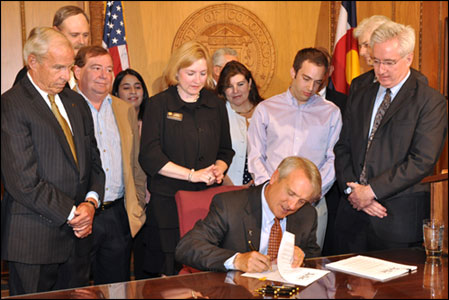Governor makes flexibility official
With Senate Bill 3 signed into law, CU and other institutions gain some short-term relief

Photo/Leonid Balaban |
| CU President Bruce D. Benson, far left, looks on with university representatives and others as Gov. Bill Ritter signs the higher ed flexibility bill into law at the Capitol. |
Gov. Bill Ritter signed legislation June 9 giving public colleges and universities greater flexibility in setting tuition rates and in financial affairs.
The law – developed by lawmakers and the governor's Higher Education Strategic Plan Steering Committee, along with input from higher education representatives – provides short-term relief for the institutions at a time when state funding is decreasing.
The bill had been negotiated and revised since last summer, and was given final approval just days before this year's legislative session ended.
"We all have an appreciation for this challenge that we face in this state where higher ed funding is concerned," Gov. Ritter said before signing Senate Bill 3 into law. "It's been a challenge for us as a state for a very long time. Some of this has to do with how we restricted spending in the Constitution and really (didn't protect) higher ed funding at the same time. As a result of that, when we've gone into downturns particularly, higher ed funding has just been bruised in a really serious way."
SB 3 allows governing boards to determine annual tuition increases that do not exceed 9 percent. Institutions seeking increases greater than 9 percent must receive approval from the Colorado Commission on Higher Education for financial and accountability plans. The plans would include how the institutions would preserve access and affordability for low- and middle-income students.
"With higher education facing cuts next year, it was imperative that we take action to keep colleges and universities affordable and open for Coloradans of all income levels," said Sen. John Morse, D-Colorado Springs, one of the bill's sponsors. "Senate Bill 3 is about doing what is absolutely necessary to keep colleges and universities open and to keep Colorado's economy on track."
The governor, who is not running for re-election in November, said the bill was not a long-term solution to the problem. Colorado ranks near the bottom of all states when it comes to funding education.
"This is not a panacea ... but the right thing for institutions in the state," Ritter said.
The governor also signed House Bill 1428, which allocates $35 million in funds from CollegeInvest to benefit higher education.
"Too many of our students still cannot afford college. That's why I am so proud that in this budget climate, we were able to shore up millions of dollars for scholarships, need-based aid and job training programs," said Rep. Karen Middleton, D-Aurora, who sponsored the bill.

|